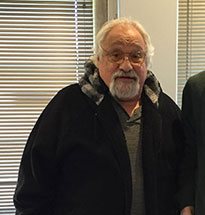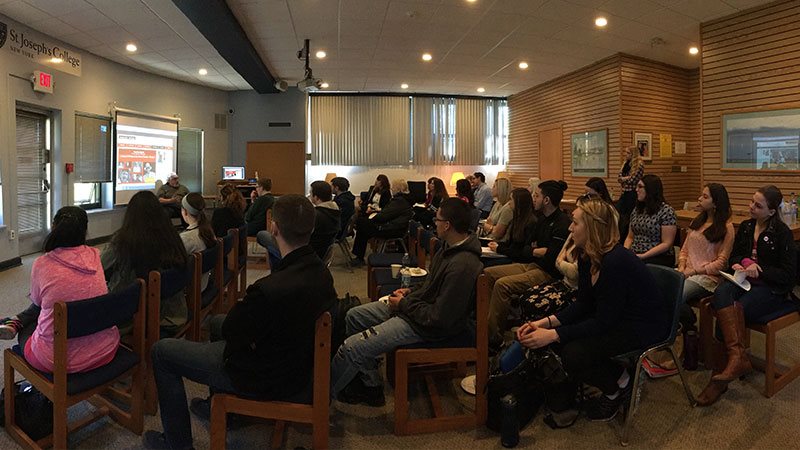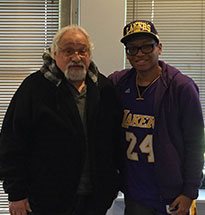BROOKLYN
245 Clinton Ave., Brooklyn, NY 11205
Main: 718.940.5300
Admissions: 718.940.5800
Fax: 718.940.5680
LONG ISLAND
155 W. Roe Blvd., Patchogue, NY 11772
Main: 631.687.5100
Admissions: 631.687.4500
Fax: 631.687.4539
April 18, 2016

By Valerie Esposito and David Henne
Corruption. Conviction. Closure. Three words that would define Barry Gibbs' life.
Invited by SJC Long Island’s Criminal Justice and Political Science clubs, and the Department of Religious Studies, Gibbs visited the campus April 14 to share the disturbing tale of how he spent nearly two decades in prison for a murder he did not commit. The bogus investigation that landed Gibbs in prison was led by a corrupt New York City Police Department detective later convicted of arranging and committing several murders and cover-ups on behalf of the Luchese crime family.
“I was in total shock,” Gibbs, 65, told an audience of students, staff and faculty from the College, recalling the moment a jury found him guilty of the 1986 strangulation of a woman in Brooklyn. “I’ll never forget the sound of the doors closing. It sounded like my life was over.”
“I’ll never forget the sound of the doors closing. It sounded like my life was over.”
Gibbs was a mailman, living and working in New York City, when the body of a prostitute named Virginia Robertson was found dumped on the Belt Parkway. The Vietnam veteran and father of one had recently divorced and was working part-time at a deli to make ends meet.
Gibbs’ nightmare began on a day off from work. Leaving his apartment, he was ambushed by NYPD Det. Louis Eppolito and thrown into the backseat of an unmarked police car. Later, when asked to participate in a police lineup, Gibbs consented.
He also agreed to let cops search his apartment. He said he did not realize a case was being built against him, based on false evidence, fraudulent witness testimony and corrupt policing. When he was placed under arrest and locked in a jail cell, he used his one phone call to ask his ex-wife to hire an attorney for him as soon as possible.

Barry Gibbs speaks with SJC Long Island students on April 14
In 1988, following a trial in which his defense attorney assured Gibbs that he had nothing to worry about, Gibbs was convicted of second-degree murder and sentenced to 20 years in prison.
“I was extorted the first few days I was in Attica (Correctional Facility). [Other prisoners] put an ice pick to my neck,” Gibbs told the audience in O’Connor Hall’s Shea Conference Room. “If I hadn't been in Vietnam, I don't think I would have been able to handle it.”
Desperate to have his case heard, Gibbs began writing from prison to The Innocence Project, a national litigation and public policy organization dedicated to exonerating wrongfully convicted individuals. With only three percent of cases accepted, they turned him down due to an already overwhelming caseload. Still, Gibbs persevered, requesting appeals and working on his own case with the help of people in the prison’s law library.
“I wasn’t eligible for parole for years, but even then, the parole board only wants to hear remorse,” said Gibbs. “I was an innocent man and I had nothing to be remorseful of. I was so ready to die that I decided to set up a life insurance policy and purchase a cemetery plot.”
“I was an innocent man and I had nothing to be remorseful of. I was so ready to die that I decided to set up a life insurance policy and purchase a cemetery plot.”
In 1999, Eppolito began appearing on talk shows about a book he wrote called Mafia Cop. When Gibbs saw Eppolito on television, he knew people would finally believe that he was innocent.
The Innocence Project eventually accepted his case and light was shed on the original witness misidentification, tampered testimony and missing physical and biological evidence in Gibbs’ case. Gibbs was soon set free.
In 2005, the witness who testified at Gibbs’ trial recanted his testimony. He said Eppolito had threatened his family if he didn’t identify Gibbs in the police lineup and in court.
“When I was finally exonerated and released, they asked me what I wanted,” Gibbs said. “I wanted a shower and a lobster tail stuffed with crab meat.”
In 2010, New York City paid Gibbs $9.9 million, the largest personal settlement in its history.
Two criminal justice majors in attendance, Scott Grossman and Christian Vizcarra, offered their own reflections on Gibbs’ experience.
“Barry Gibbs truly is an inspiration for anyone who has been incarcerated — guilty or innocent. He is a man with great psychological power and should be looked up to by all.
“This man had his life stripped away from him, torn away from his family, his son, his wife and countless friends. When asked what kept him going when he was locked up, Gibbs had a simple response: a shower. This once-free man working for the government now was only living so he could shower the next day.
“Many could not even imagine being locked up for a day for something you did not do, now imagine being in prison for nearly 20 years.” — Scott Grossman
“The majority of people could not even fathom the emotions felt being incarcerated for something you did not do. Most people would crumble if placed under the same conditions that Barry Gibbs went through for nearly 20 years.
“Although it was extremely heartbreaking to hear Gibbs’ story, it was comforting to hear that he is currently doing well and is reconnected with his son. Barry’s presentation was essential because it allowed for people to understand that the criminal justice system needs reform.
“In regard to reforming the appeal system, Gibbs himself thought it was too lengthy and extremely difficult to have one’s case heard. Overall, it was nice to hear that Gibbs received a settlement for his false conviction, but like he said ‘Nothing can fix what I lost in those 20 years.’” — Christian Vizcarra

To learn more about The Innocence Project, visit innocenceproject.org or follow The Innocence Project on Twitter @innocence.
Big thank you to @Innocence Project speaker Barry Gibbs for taking time today to talk with SJC Long Island students. pic.twitter.com/xaWMCLpLJU
— St. Joseph's College (@SJCNY) April 14, 2016
Get Social
Get Social